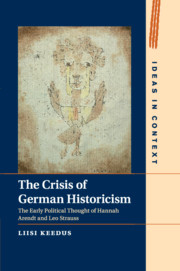Crossref Citations
This Book has been
cited by the following publications. This list is generated based on data provided by Crossref.
Owens, Patricia
2017.
International Origins of Social and Political Theory.
Vol. 32,
Issue. ,
p.
37.
Vega, Facundo
2017.
On the Tragedy of the Modern Condition: The ‘Theologico-Political Problem’ in Carl Schmitt, Leo Strauss, and Hannah Arendt.
The European Legacy,
Vol. 22,
Issue. 6,
p.
697.
Гуторов, Владимир
2019.
Образование в современном политико-теоретическом дискурсе (библиографический обзор).
Полис. Политические исследования,
p.
107.
Shaw, Beau
2019.
“The God of This Lower World”: Leo Strauss's Critique of Historicism inNatural Right and History.
The Review of Politics,
Vol. 81,
Issue. 1,
p.
47.
Keedus, Liisi
2020.
“The New World” of Karl Barth: Rethinking the Philosophical and Political Legacies of a Theologian.
The European Legacy,
Vol. 25,
Issue. 2,
p.
167.
Arese, Laura
2020.
Judaísmo, filosofía e historia. Acerca de la lectura arendtiana de Lessing, Mendelssohn y Herder en los tempranos años 30.
Res Publica. Revista de Historia de las Ideas Políticas,
Vol. 23,
Issue. 2,
p.
217.
Tuori, Kaius
2020.
Empire of Law.
2020.
Counsel and Command in Early Modern English Thought.
p.
245.
2020.
Polish Republican Discourse in the Sixteenth Century.
p.
269.
Suuronen, Ville
2023.
Carl Schmitt’s Confrontation with the Work of Hannah Arendt: A Debate on Totalitarianism, Power, and Banality of Evil.
Global Intellectual History,
Vol. 8,
Issue. 3,
p.
270.





